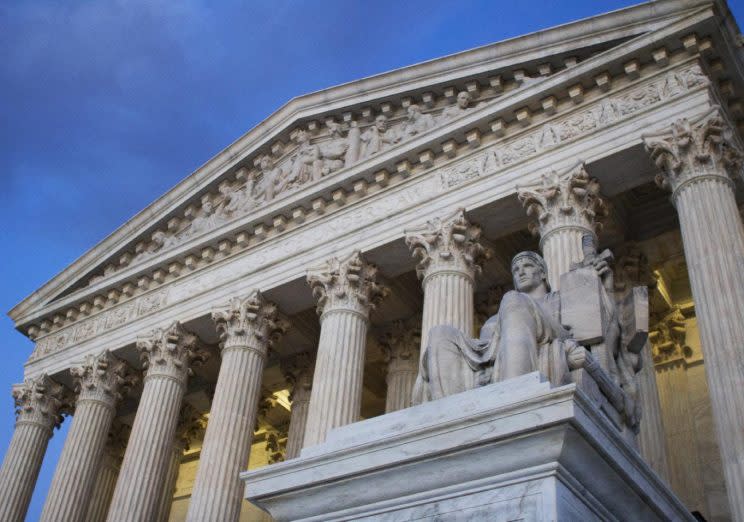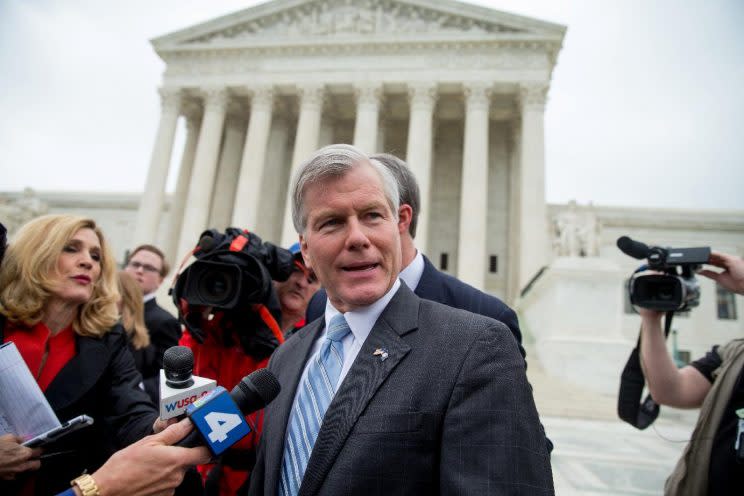SCOTUS ruling makes corrupt officials harder to prosecute, experts say

Some law scholars fear the Supreme Court’s Monday decision to overturn a high-profile bribery conviction will make it more difficult for the Justice Department to bring anticorruption or bribery prosecutions against U.S. officials.
Former Virginia Gov. Bob McDonnell was found guilty of accepting more than $165,000 in gifts and loans from Star Scientific CEO Jonnie Williams in exchange for pushing his dietary supplement. But the high court voted to narrow the scope of an anticorruption law that prohibits public officials from accepting gifts in exchange for “official action.”
Jessica Tillipman, a lecturer at the George Washington University Law School, told Yahoo News that it’s going to be “much, much tougher” for prosecutors to gather enough evidence to reach this new standard of corruption. That is, authorities will need to establish documented, overt pressure.
“What’s shocking in this instance is that your average American looks at this case and sees corruption,” Tillipman said. “There’s a distance between the law and what citizens consider corruption.”
Tillipman said academics who teach and write about anticorruption were concerned that the ruling would come down this way as soon as the Supreme Court accepted it.
McDonnell maintains that he never took “official action” to help Williams or put any pressure on other public servants to take such actions. But McDonnell did help arrange meetings for Williams with Virginia health officials and appear at promotional events. He maintains that the Justice Department was persecuting him for doing something that came with the territory of his position.
Chief Justice John Roberts wrote in the opinion for the unanimous Supreme Court decision that the instructions to the trial jury for what constitutes an “official act” were broad enough that it might stop U.S. officials from interacting with their constituents.
“There is no doubt that this case is distasteful; it may be worse than that. But our concern is not with tawdry tales of Ferraris, Rolexes and ball gowns,” Roberts wrote. “It is instead with the broader legal implications of the government’s boundless interpretation of the federal bribery statute. A more limited interpretation of the term ‘official act’ leaves ample room for prosecuting corruption, while comporting with the text of the statute and the precedent of this court.”

Bertrall Ross, a professor at University of California, Berkeley, School of Law, said narrowing the definition of an “official act” so it does not include arranging a meeting, contacting government officials or hosting an event sets a precedent for how future courts will interpret the phrase. He said the ruling is bad for anyone interested in holding government officials accountable.
“It makes it easier for government officials to conduct business with individuals in a way that doesn’t necessarily comport with their obligations to advance the public good and instead allows them to serve special interests, in a way that perhaps we don’t want our government officials to serve,” Ross told Yahoo News.
He said McDonnell’s actions would fit the definition of bribery for most laypeople.
“You have a wealthy donor that is giving money to the governor and his wife, and they want something in return,” Ross said. “And that governor gives them something in return: He arranges a meeting, he hosts events, he contacts government officials. And that is something of value.”
Tillipman further said the Supreme Court had already repeatedly narrowed the scope of the white- collar, corruption and bribery statutes on the books. She cited the case of United States v. Sun-Diamond Growers of California, which determined gifts to a public official must be tied to an “official act” to constitute corruption.
“This is no different. It’s not too surprising, given the history, but it’s definitely raised the bar by requiring the government to find evidence of these kind of overt official actions that are often absent in corruption cases, because things are kind of done with a wink and a nod,” she said of the Monday ruling.
Tillipman, who teaches a mix of domestic and foreign anticorruption, said it’s troubling that the U.S. keeps narrowing the applicability of its own corruption laws while simultaneously using statutes like the Foreign Corrupt Practices Act to expand its prosecution of cases abroad.
“I find it troubling that we are going after cases internationally and in other countries and trying to send a message to the world to clean up their corruption,” she said, “while simultaneously we’re watching our government limit corruption prosecutions here, and limit the authority to basically prosecute the corruption of our own officials.”
Jesse H. Choper, professor emeritus of public law at UC Berkeley Law, said he had long predicted that the biggest obstacle to the country’s democratic system would be campaign money.
“We would have our heads in the sand if we believed that people who are big campaign donors don’t get anything in return,” he told Yahoo News.
Choper said a simple bribery case might be clear, but it’s a lot harder to determine where the legal line should be within the entire range of campaign-fundraising activities. He cited a political figure raising campaign cash while hearing out what his or her donors have to say about the issues.
“It’s not the clearest line all of the time,” he said.
Related slideshows:
Slideshow: SCOTUS strikes down strict Texas abortion law regulations >>>


